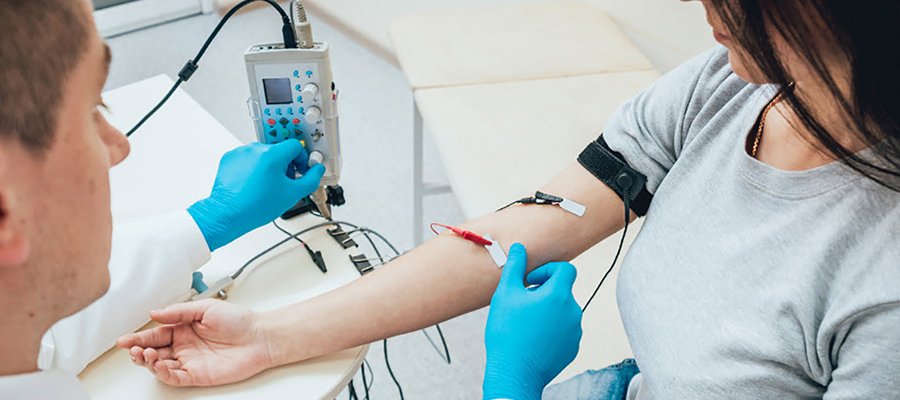
Estimated reading time: 3 minutes and 42 seconds
Electromyography (EMG)
Comprehensive Electromyography (EMG) Services at Aktif International Hospitals
Electromyography (EMG) is a diagnostic test used to evaluate the electrical activity of muscles and the nerves controlling them. EMG testing is an essential tool in the diagnosis and management of various neuromuscular disorders, including nerve compression syndromes, muscle diseases, motor neuron disorders, and peripheral neuropathies. At Aktif International Hospitals, we offer comprehensive EMG services performed by experienced neurologists and technicians to provide accurate diagnosis, personalized treatment plans, and optimal care for our patients.
Frequently Asked Questions
What is electromyography (EMG), and why is it performed?
Electromyography (EMG) is a diagnostic test that measures and records the electrical activity of muscles and the nerves controlling them. EMG is performed to:
- Evaluate muscle function: EMG can assess the health and function of muscles by measuring their electrical activity during rest and contraction. Abnormal patterns of muscle activity may indicate muscle diseases, nerve disorders, or neuromuscular conditions.
- Assess nerve function: EMG can evaluate the electrical signals transmitted by nerves to muscles and detect abnormalities or disruptions in nerve conduction, such as nerve compression, nerve damage, or peripheral neuropathy.
- Diagnose neuromuscular disorders: EMG testing is an essential tool in the diagnosis and management of various neuromuscular disorders, including carpal tunnel syndrome, radiculopathy, myopathy, myasthenia gravis, amyotrophic lateral sclerosis (ALS), and Guillain-Barré syndrome.
- Guide treatment decisions: EMG results can provide valuable information for physicians to diagnose underlying conditions, develop personalized treatment plans, monitor disease progression, and assess treatment effectiveness.
Who is a candidate for an EMG?
Candidates for an EMG may include individuals who experience:
- Muscle weakness, stiffness, cramping, or pain
- Numbness, tingling, or loss of sensation in the hands, arms, legs, or feet
- Symptoms suggestive of nerve compression syndromes, such as carpal tunnel syndrome, cubital tunnel syndrome, or tarsal tunnel syndrome
- Motor or sensory symptoms suggestive of peripheral neuropathies, such as diabetic neuropathy, Charcot-Marie-Tooth disease, or chronic inflammatory demyelinating polyneuropathy (CIDP)
- Signs or symptoms suggestive of neuromuscular disorders, such as muscle weakness, fatigue, difficulty swallowing or speaking, or changes in gait or coordination
- Monitoring of disease progression or treatment effectiveness in patients with known neuromuscular conditions
How is an EMG performed?
An EMG is performed by inserting small needle electrodes into the muscles of interest to detect and record their electrical activity at rest and during voluntary contraction. The EMG procedure typically involves the following steps:
- Preparation: The patient may be asked to change into a gown and remove jewelry or accessories that may interfere with the test. The technician cleans the skin and inserts thin, sterile needle electrodes into specific muscles identified for testing.
- Recording: The patient is instructed to relax while the technician records the electrical activity of the muscles at rest. The patient then performs a series of controlled muscle contractions, such as flexing or extending the limbs, while the technician records the electrical responses of the muscles.
- Interpretation: A neurologist or EMG specialist analyzes the EMG recordings, interpreting the patterns of muscle activity and nerve conduction to identify any abnormalities or irregularities suggestive of neuromuscular disorders.
What are the benefits of an EMG?
An EMG offers several benefits for individuals undergoing neuromuscular evaluation, including:
- Diagnosis of neuromuscular disorders and nerve compression syndromes
- Evaluation of muscle and nerve function
- Guidance for personalized treatment plans and interventions
- Monitoring disease progression and treatment effectiveness
- Identification of abnormalities or irregularities in muscle and nerve activity
Trust Aktif International Hospitals for Comprehensive EMG Services
At Aktif International Hospitals, we understand the importance of accurate diagnosis and personalized treatment for neuromuscular disorders, and we are committed to providing comprehensive EMG services to support the health and well-being of our patients. Our team of experienced neurologists, technicians, and healthcare professionals specializes in EMG testing and interpretation and offers personalized care tailored to your unique needs and concerns. Whether you require EMG testing for nerve compression syndromes, muscle diseases, or other neuromuscular conditions, you can trust Aktif International Hospitals to deliver high-quality EMG services with compassion and expertise. Schedule your consultation with us today and experience the difference at Aktif International Hospitals.
Yazar: Jafar Zardi Dehkharghani


 TR
TR